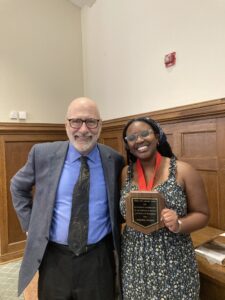
Beannachtaí ó Luimneach, or greetings from Limerick!
I alluded to one Irish entry while on holiday, so here it is.
I have been at the the EWCA Conference, my second visit to the University of Limerick on the banks of the River Shannon. While here, I presented data from my and research assistant Cady Cummins’ second year of surveying students about their use of generative AI for writing assignments.
The Irish have more than lived up to their reputation as welcoming folks, hosting us in comfort and catering to our needs while on the campus. We closed out our second day with a delightful “barbecue” at a campus pub, where over pints of Guinness and hard cider, local musicians and a step-dancer held a proper “session” for academics who arrived from as far as South Africa.
You see posters in every Irish city for traditional Irish music sessions, called seisiún in Irish, so I wondered about the origin of this common word. The Etymology Dictionary Online provides an interesting history, starting with sitting down, which is what the audience does during a seisiún, though an Irish colleague who dances did join in the fun for a while.
You may have heard of a Cèilidh, pronounced kay-lee, which I had understood to mean an informal and spontaneous jam-session in a pub. This word can also embrace other sorts of informal meetings for social visits, including in a home. Sessions, on the other hand, appear to be public events that are planned ahead.
The word “session” dates back to the 14th Century, “from Old French session ‘act or state of sitting; assembly,’ ” with far older roots, “from Latin sessionem (nominative sessio) ‘act of sitting; a seat; loitering; a session, ‘ ” which makes our Irish and English words both borrowings from the Romans.
Sessions happen concurrently at conferences, Congress and other legislators are “in session,” and you can probably add dozens of other contemporary uses of the word, including “bull session” and more. So put down your phones, have one of those bull sessions in person, and decide where to go to hear some live music this summer. It’s probably closer than Limerick, though perhaps not quite as fun.
This blog continues all summer after a hiatus (a 2022 WOTW) for the rest of June, while I finish holidays and plan the next long journey to Ireland; Donegal and the North next time, on a driving tour into the backcountry, like our first one in the Southwest back in 2011.
As you enjoy your holidays, send words and metaphors to me by e-mail (jessid -at- richmond -dot- edu) or leaving a comment below.
See all of our Metaphors of the Month here and Words of the Week here.


